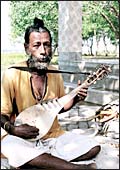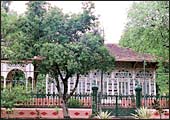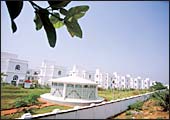|
Rabindranath
Tagore gave practical shape to his lifelong opposition to the modern
school system by founding Shantiniketan (literally: Abode of Peace)
in the picturesque and idyllic Birbhum district, some 225 km from
Kolkata. The poet's model: the gurukuls of ancient India. His students-including
a large number of foreigners-lived and learnt in the lap of nature;
most classes were held under open skies or under trees; life flowed
with the rhythm of the seasons; and teachers and students interacted
with each other in informal surroundings.
Cut to the present. It's still serene and
tranquil. But signs of rapid urbanisation and decay are visible
everywhere. "Tagore built his university in Shantiniketan
so that students and faculty members could develop a conscious
rapport with nature. Unfortunately, it has become an uncouth urban
mess," says Supriya Thakur, a scion of the Tagore clan.
 |
| New and old: Sonar Taree (top), a new
housing complex named after the famous Tagore poem, and a
Baul folk singer practising his art |
He's right. But the changing skyline is only
a physical manifestation of the distance Shantiniketan has travelled
from the values of its founder. The bigger story surrounding Tagore's
legacy is about the atrophy at Visva-Bharati University. "Very
disturbing and worrying," is how Thakur describes it. True.
The unthinkable has happened: a former Vice Chancellor has been
arrested on fraud charges; and Tagore's Nobel Medallion and citation,
stolen from the Visva-Bharati Museum on March 24, 2004, has still
not been recovered. And rumours about the theft being an inside
job refuse to die. "I, and others like me, object to the
rampant politicisation of the faculty, to Visva-Bharati's new-found
fondness for various science streams and to the excessive degree
orientation among students," says Thakur.
Adds Vice Chancellor Sujit Basu: "Gurudev
(Tagore) himself said in 1925 that Visva-Bharati should impart
training and education that helps domestic industry grow."
The VC candidly admits that the state of affairs at the university
can do with some improvement. "There was no finance officer
and no registrar till recently and three directors' posts were
lying vacant for years. The rulebook was thrown to the winds and
all decisions were taken on an ad hoc basis. This naturally led
to anarchy and financial mismanagement," he says, adding:
"However, we are now trying to streamline procedures."
Basu also admits that a section of university staff (including
some at high levels) and students make money by manipulating admissions,
recruitments, purchases and awards of contracts. "We will
take all necessary action soon," he says.
 |
 |
| Abode of peace? Even as classes continue
under trees (top) and the meditation room or Upasana Griha
is much in use, there is a sense of disquiet |
A priority for the authorities is to restore
the residential status of the university. Its hostels can accommodate
only 1,500 out of its 6,500 students. The requirement: 50 new
hostels. "Cultural conflicts are bound to take place when
students staying on campus-and following a particular set of values-come
into contact with students living outside. This is not desirable,"
says the VC.
Meanwhile, real estate developers, who are
marketing Shantiniketan as a "second home destination",
are at pains to defend themselves. "Several famous authors,
painters, musicians and other artistes have bought these houses;
they only add to the cultural richness of the place," says
K.S. Bagchi, Managing Director, Bengal Peerless Housing Development
Company, which has built the Sonar Taree (named after a famous
Tagore poem) housing complex.
 |
"Urbanisation is
inevitable. Tagore himself built some of these buildings.
So, arguments against new developments do not hold good"
Sujit Basu
VC/Shantiniketan |
Lok Sabha Speaker Somnath Chatterjee, who
is the local mp and also Chairman of the Sriniketan Shantiniketan
Development Authority (SSDA), is standing solidly behind the development
activities. Says Chatterjee: "The development, which has
taken place in Bolpur and Shantiniketan over the last couple of
years, has to be seen to be believed. Only a handful of people
are opposing it, by taking recourse to falsehood. Election results
prove that people support these development works or urbanisation
or whatever name you may give it to. We will continue to fulfil
people's aspirations." The Visva-Bharati agrees. "Tagore
himself built several concrete buildings, including Uttarayan
on Khoai. So, arguments against the present development works
do not hold good," says the VC.
It's an old debate, really. And it's also
one of those issues that doesn't have a clearly defined right
answer. But unless we can come up with one that satisfies all
sides-and all of them are right from their own perspective-the
country will be the poorer from the loss of a unique cultural
legacy.
|








